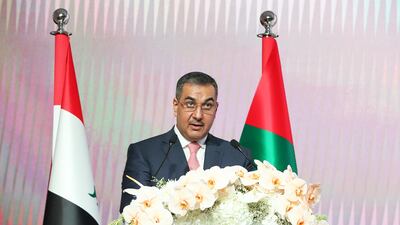Iraq's Prime Minister has dismissed the governor of the country's central bank and assigned its former chief, Ali Mohsen Al Alaq, to replace him in an attempt to assuage public anger over a currency crisis that has led to an increase in the prices of goods.
Mohammed Shia Al Sudani summoned Mustafa Ghaleb Mukheef last month amid worries sparked by the Iraqi dinar falling sharply against the dollar.
Mr Al Alaq led the Central Bank of Iraq from September 2014 to September 2020.
Mr Mukheef is close to Shiite cleric Moqtada Al Sadr, who is boycotting Mr Al Sudani's government, while Mr Al Alaq is close to the State of Law political group, one of the Prime Minister's main backers.
Mr Al Sadr's political group, the Sadrist Movement, emerged as the biggest in parliament after elections in October 2021, winning 73 of the 329 seats but it failed to form a government.
His withdrawal from the political process was in protest against what he called illegal attempts, mostly by the Iran-backed Co-ordination Framework, to block the formation of a government. The Co-ordination Framework later formed the government, bringing in Mr Al Sudani.
Since taking office in late October, the Prime Minister has been replacing government officials with others close to Co-ordination Framework.
Seven billion dinars 'drowned'
Mr Al Alaq's term in office was mired by the destruction of seven billion Iraqi dinars when rainwater entered the vault of the state-run Al Rafidain Bank and spoiled the paper banknotes.
"Your resume (CV) should have a clear sign of failure to assume a sovereign position," said politician Salah Al Arbawi, founder of the independent Waie Movement.
"For instance, seven billion Iraqi dinars drowned in your term."
Iraq's currency has been experiencing a two-month roller-coaster ride after a tightening of procedures for international transfers, with some blaming Washington for the dinar's problems.
While the official exchange rate has been fixed at 1,460 dinars against the dollar, the currency was trading at up to 1,630 to the greenback on some markets.
The US has been complaining that the dollar is being funnelled to Iran, Syria and Lebanon through the foreign currency auction run by the Central Bank of Iraq. Iran and Syrian are under US sanctions.
Since early December, the Federal Reserve Bank of New York has applied strict scrutiny measures on requests for international transactions from Iraq, rejecting many and delaying others, leading to increased demand for the dollar in Iraqi markets.
It has also blacklisted several Iraqi banks suspected of money laundering and suspicious transactions.
Mr Al Sudani's Iran-backed government, which has blamed the US for the dollar chaos, has taken series of measures to contain the public anger over skyrocketing goods prices, to no avail.

It has allowed citizens travelling outside Iraq to buy $5,000 at a rate of 1,470 dinars and eased the process for small merchants and importers to buy the dollar. Those travelling or dealing with US-sanctioned countries are not entitled.
In an unprecedented move, security forces raided two of Baghdad's biggest markets for the US dollar on Saturday and arrested several traders who it blamed for "manipulating" the exchange rate.
The Interior Ministry on Sunday confirmed the arrest of traders for "manipulating the exchange rate".
The depreciation has sent panic through the Iraqi population, which fears a price surge on imported goods such as food, mainly wheat.
Later on Monday, Mr Al Sudani assured citizens his government would control the exchange rate and goods prices in the market. He was speaking at a ceremony to launch a programme to distribute baskets of subsidised food items for 5.1 million people under a state-run social protection scheme.
The oil-rich nation sits on good foreign currency reserves and has stacked a record $100 billion thanks to healthy oil prices in the international market.
"The fundamental reason" for the dinar's depreciation was "external constraints", said Muzhar Saleh, a financial adviser to Mr Al Sudani.

